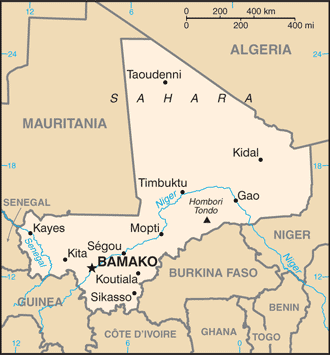 Image Courtesy of CIA World Factbook
Image Courtesy of CIA World Factbook
Instability in West Africa: The U.S. Moving Forward
The recent overthrow of the Malian government threatens further stability and security threats to a region already facing an increase in destabilization. This issue adds further complexity to U.S. engagement and intentions in West Africa’s budding arena of Great-Power Competition. Increasing destabilization in West Africa and its emergence as a battleground for Great-Power Competition highlights the need for reevaluation of U.S. strategy and commitments in the region.
Issues Contributing to Destabilization
Governmental Instability
The recent coup is indicative of increasing governmental instability in the West Africa region. Recent years have seen attempted coups, electoral disputes, and weakened security apparatuses plague Mali’s neighbors. Alarmingly, a 2019 report forecasted a cluster of West African countries as some of the most at-risk countries for coup attempts.
Two military coups in less than a decade is a drastic step backwards for Mali, a nation once christened a regional model of democratic stability. The aftermath of the 2012 coup, which saw al-Qaeda-aligned insurgents make substantial territorial gains, is a reflective area of concern for American and French officials gauging the most recent coup’s destabilizing potential.
Increasing Militant Activity
Since mid-2017, West Africa has experienced a dramatic increase in violence tied to increasing activity from al-Qaeda and ISIS-aligned militant groups. Weeks of protests preceding the Mali coup centered on increasing civilian-directed terrorism and violent territorial disputes. While most of the activity centers around the Mali, Burkino Faso, and Niger tri-border region, worries of spillover effects for neighboring countries continue increasing.
Cultural Issues and Ethnic Tensions
Tensions between the government and a growing separatist uprising by northern Tuareg rebels were an important ignition for the 2012 military coup. The ensuing partnership between Tuareg rebels and militant Islamists, which fueled instability in northern and central Mali, is seen as a direct source of exacerbated cultural and ethnic tensions to this day.
Violence between Tuareg rebels and the government still continued after the 2012 coup resolution, but clashes between the Dogon and Fulani people, whose conflicts stem from the exploitation of natural resources, have also become increasingly violent. The exploitation of ethnic tensions by extremist groups is also seen as a critical factor in these conflicts.
Humanitarian Crisis
Issues such as food insecurity, displacement, and the COVID-19 pandemic are fueling a quickly developing humanitarian crisis in the region. In 2019, ASP wrote about climate change’s indirect contributions to Sub-Saharan instability and the security risks it poses.
U.S. Position and Interests in West Africa
With the U.S. National Defense Strategy (NDS) now emphasizing Great-Power Competition (GPC) with Russia and China, U.S. engagement in West Africa has been put into question. The current administration argues that facilitating proper deterrence against competitors requires reallocating resources from lower priority regions. However, not recognizing the West African front as an important aspect of GPC would be lacking in foresight.
The U.S. still has economic, diplomatic, and global health interests in the region, all dependent on regional stability. Not utilizing development finance tools and other methods of combating instability runs the risk of Russian and Chinese spheres of influence growing in the region.
One consequence of the NDS shift is counterterrorism’s decrease in priority. Support of counterterrorism operations in the region, such as France’s Operation Barkhane, has been an important contributing factor of U.S. engagement. Recently, the Trump administration stated its intention to relocate and make cuts to U.S. military engagement in Africa, along with threatening to pull back support for France’s mission. This could have a critical impact on regional stability, putting U.S. interests, including deterrence of a growing jihadist threat, at further risk.
Policy Suggestions
Maintain the Status Quo
This position includes maintaining current economic investments, regional diplomatic ties, and re-establishing U.S. commitment to allied missions in the region.
Advantage: Allows the U.S. to maintain an important presence in West Africa, counter the growing jihadist threat, and maintain the integrity of the change in the NDS.
Disadvantage: Growing instability creates an unpredictable climate which will force the U.S. to refine its strategy and methods to fulfill objectives, some unreachable with the current level of investment.
Increase Investments
This position maintains the assumption that the U.S., like many allies and competitors, views the African theatre as a stage of necessary investment.
Advantage: Increasing investments in stability operations such as counterterrorism, infrastructure, and global health assistance campaigns could go a long way to stamping U.S. influence over Russia and China in the region.
Disadvantage: Pushback from this would come from officials still questioning West Africa’s importance in GPC and the toll increased investments in the region might hold for other priorities.
Continue Drawback
This position has recently been more geared towards counterterrorism operations, not necessarily other forms of investment.
Advantage: Reallocating troops and funding from West Africa would allow the U.S. to project more power in higher priority regions involved in Russian and Chinese deterrence.
Disadvantage: By not acknowledging West Africa’s importance in GPC and drawing back from investments to bolster regional stability, the U.S. risks losing regional influence, a growing jihadist threat, and relations with key allies. As AFRICOM commander Gen. Stephen Townsend succinctly noted in a brief, “a few troops and few bucks can go a long way to make a real difference in Africa.”





